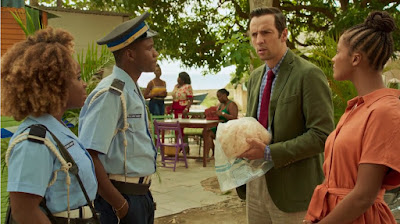This was the first episode of the show I’ve seen having the new detective inspector (Neville Parker, played by Ralf Little). Difficult to get traction with a new main cast member, but the makers of this show have done a good job because Parker is both quintessentially normal and irritatingly different from the previous exponents in the role.
Parker is always to be seen putting on or taking off a backpack, though what is in it is not always clear. He uses a digital voice recorder to take notes while investigating on-site, so presumably keeps this device in the carry-all. Along with insect repellent. DS Madeleine Dumas (Aude Legastelois) repeatedly teases Parker on account of his allergies, adding opportunities for humour to the script.
This episode contains elements of pathos, for example in the youthful misdeeds of one of the accused, Georgine Perault (Ellen Thomas). Her sister Eleanore Beaumont (Doña Croll) is murdered while sitting under a dryer in a hair dressing salon. Eleanore owns the salon but Georgine’s two daughters – Kiki and Cynthia Perault (Rochelle Rose and Kiké Brimah) – are working that day. They were doing Eleanore’s hair for the occasion of Cynthia’s wedding.
Who stabbed Eleanore? Early suspicions surround Georgine on account of her having had both children raised by Eleanore, but Parker is not satisfied with the reasoning behind such an accusation. As usual, the plot turns on a memory – in this case Parker recalling something that had happened on a different case, when he worked in England – but more demanding from the viewer’s point of view is Officer Ruby Patterson’s (Shyko Amos) indiscretion, which forces her uncle, Commissioner Selwyn Patterson (Don Warrington), to take her off the case.
Naturally everything turns out ideally. But the poetry is in the gentle humour deployed by the filmmakers as they negotiate the echoes of colonialism. In this episode, for example, Commissioner Patterson is put in a difficult position due to the poor conduct of his relative. What he does in the case is instructive. By standing Ruby down, the commissioner raises himself up in our esteem. The situation is not overly dramatic – typical of this low-toned creation – but within the mundane confines of the narrative locus the tremors are felt everywhere, even in the mind of Ruby’s colleague, Officer J.P. Hooper (Tobi Bakare) who, as usual, delivers a strong performance.
I like how the filmmakers poke fun at authority – Commissioner Patterson with his stuffy persona, Parker with his ridiculous physical aversion to his surroundings – while at the same time raising real issues. The real sisterly affection at the heart of this episode is tested by the inclusion of unfaithfulness and prejudice as plot devices. Not only does Kiki betray Cynthia, but Eleanor betrays Georgine as well. Similar bonds of affection unite J.P. and Ruby and in the untying of one set of threads the filmmakers put a strain – in the viewer’s mind – on the other.
A masterful production that seems never to get old, ‘Death in Paradise’ survives by simply replacing an inspector, a sergeant, or a constable. The creative minds behind the enterprise give themselves license to take liberties with themes that truly bedevil people living in the community. Because of its broad appeal, the show actually engages with members of many different communities.

1 comment:
Do you know the actual location in Guadeloupe of this hairdressers?
Post a Comment